Medication Risk Calculator for Orthostatic Hypotension
Assess Your Risk
Enter the medications you're taking that may cause dizziness when standing up. Based on your inputs, we'll calculate your risk level.
Standing up too fast and feeling like the room is spinning? That’s not just being clumsy. It could be orthostatic hypotension-a sudden drop in blood pressure when you rise from sitting or lying down. For many people, especially those on medications, this isn’t a rare fluke. It’s a common, often overlooked side effect that can lead to falls, injuries, and even hospital stays.
What Exactly Is Orthostatic Hypotension?
Orthostatic hypotension happens when your blood pressure drops more than 20 mm Hg systolic or 10 mm Hg diastolic within three minutes of standing. That drop means less blood reaches your brain, and that’s what causes dizziness, lightheadedness, blurred vision, or even fainting. It’s not just about being out of shape. It’s a physiological mismatch: your body isn’t adjusting fast enough to keep blood flowing upward when gravity pulls it down. This isn’t something that only affects older adults. But it’s far more common in people over 70. About 1 in 3 seniors on multiple medications experience it. And in many cases, the culprit isn’t aging itself-it’s the drugs they’re taking.Which Medications Cause Dizziness When You Stand?
Not all medications cause this. But some of the most common ones do-and often without clear warnings on the label. Here are the top offenders:- Antihypertensives (blood pressure meds): Diuretics like hydrochlorothiazide, ACE inhibitors like lisinopril, and calcium channel blockers can lower blood pressure too much, especially when you stand.
- Alpha-blockers: Used for prostate issues and high blood pressure, drugs like doxazosin and terazosin block the body’s natural way of tightening blood vessels when standing. Risk jumps 2.8 times compared to those not taking them.
- Tricyclic antidepressants: Medications like amitriptyline and nortriptyline interfere with nerve signals that regulate blood pressure. These carry a 3.2 times higher risk of orthostatic hypotension.
- Antipsychotics: Clozapine, quetiapine, and chlorpromazine can cause dizziness in 20-40% of users. One Reddit user reported fainting twice after starting quetiapine-his blood pressure dropped from 128/82 to 92/61 in under two minutes.
- Opioids: Morphine, oxycodone, and hydrocodone relax blood vessels and slow down the nervous system’s response. When combined with alcohol or benzodiazepines, the risk doubles.
- Levodopa: Used for Parkinson’s, it affects blood pressure control in 30-50% of patients.
What’s worse? Many people take several of these at once. If you’re on four or more medications, your risk of orthostatic hypotension goes up nearly sixfold. It’s not just the drugs-it’s the combo.
Why Does This Happen?
Your body normally compensates for standing by tightening blood vessels and increasing heart rate to keep blood flowing to the brain. This is called the baroreceptor reflex. But many medications disrupt this process. - Diuretics reduce blood volume, so there’s less fluid to push upward.- Alpha-blockers prevent blood vessels from constricting.
- Antidepressants and antipsychotics dampen nerve signals that tell your heart and vessels to respond.
- Opioids depress the autonomic nervous system, slowing down reflexes.
It’s not always obvious. Some people don’t feel symptoms until they’ve been on the drug for weeks. Others only notice it after changing their routine-like standing up faster or skipping breakfast.
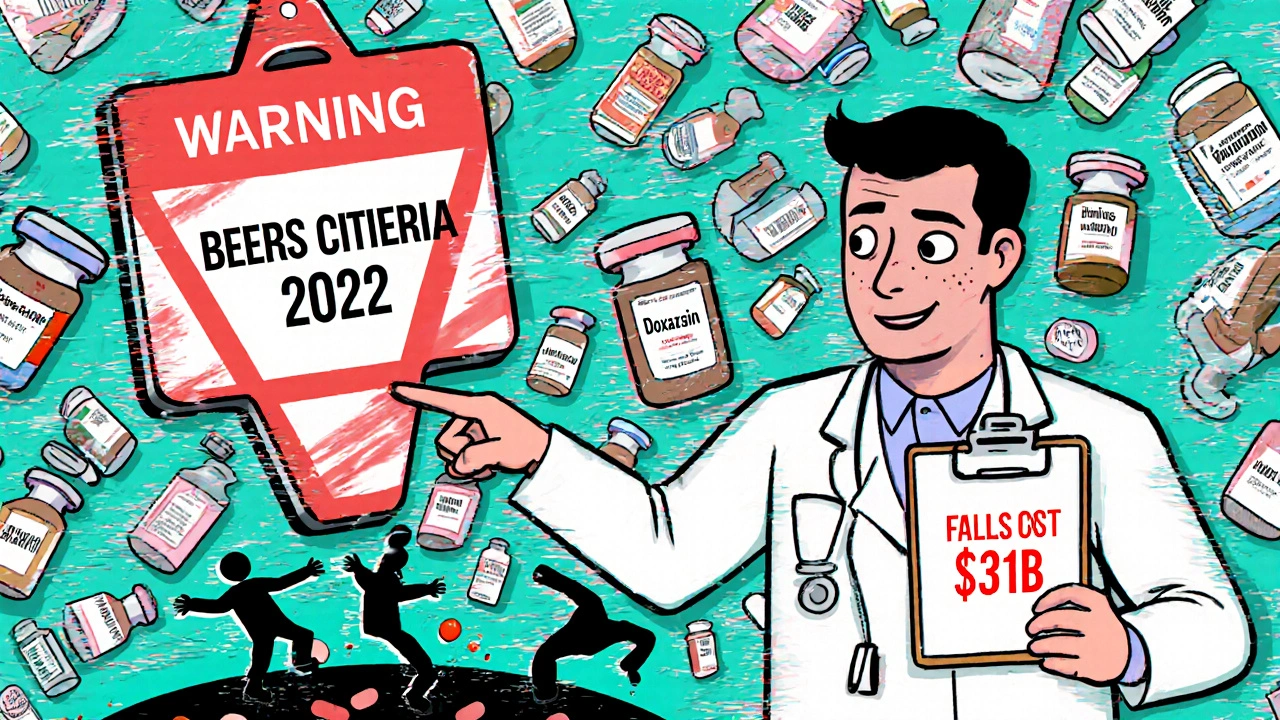
How Is It Diagnosed?
Doctors don’t guess. They measure. The gold standard is checking blood pressure after five minutes lying down, then again at one, two, and three minutes after standing. A drop of more than 20/10 mm Hg during that time confirms orthostatic hypotension. But here’s the catch: up to 40% of people with this condition don’t have symptoms. They might feel fine, but their body is still struggling. That’s why screening matters-especially for seniors on multiple meds. In one study, 55% of patients had symptoms for over two months before their doctor connected the dots to their medication. That’s too long to wait.What Happens If You Ignore It?
Dizziness might seem harmless. But the consequences aren’t. - Falls: People with orthostatic hypotension have a 15-30% higher risk of falling. These falls cause fractures, head injuries, and long-term disability.- Hospitalizations: OH-related falls cost Medicare $31 billion in 2022 alone, with 30-40% of those tied to medications.
- Long-term risk: Studies show a 24-32% higher chance of dying within 10 years if you have persistent orthostatic hypotension.
And it’s not just physical. Chronic dizziness can lead to fear of movement, reduced activity, social isolation, and even depression.
What Can You Do?
The good news? Medication-induced orthostatic hypotension is often reversible. In 65-80% of cases, symptoms improve after adjusting the meds. Here’s what works:- Review your meds with your doctor. Don’t stop anything on your own. But ask: “Could any of these be causing my dizziness?” Be specific about when it happens-right after standing? After meals? After taking a pill?
- Change how you move. Sit on the edge of the bed for a full minute before standing. Rise slowly. Avoid sudden movements. Use a cane or handrail if needed.
- Hydrate. Drink 2-2.5 liters of water daily. Dehydration makes blood pressure drop worse. A glass of water before standing can help.
- Wear compression stockings. These help push blood back up from your legs. They’re simple, cheap, and surprisingly effective.
- Avoid alcohol and large meals. Both can lower blood pressure further. Eat smaller meals more often.
- Consider midodrine. If lifestyle changes aren’t enough, your doctor may prescribe this medication. It tightens blood vessels and has been shown to reduce symptoms by 65% in clinical trials.
One patient at Cleveland Clinic had recurrent falls on six medications. After stopping hydrochlorothiazide, her dizziness vanished in 72 hours.
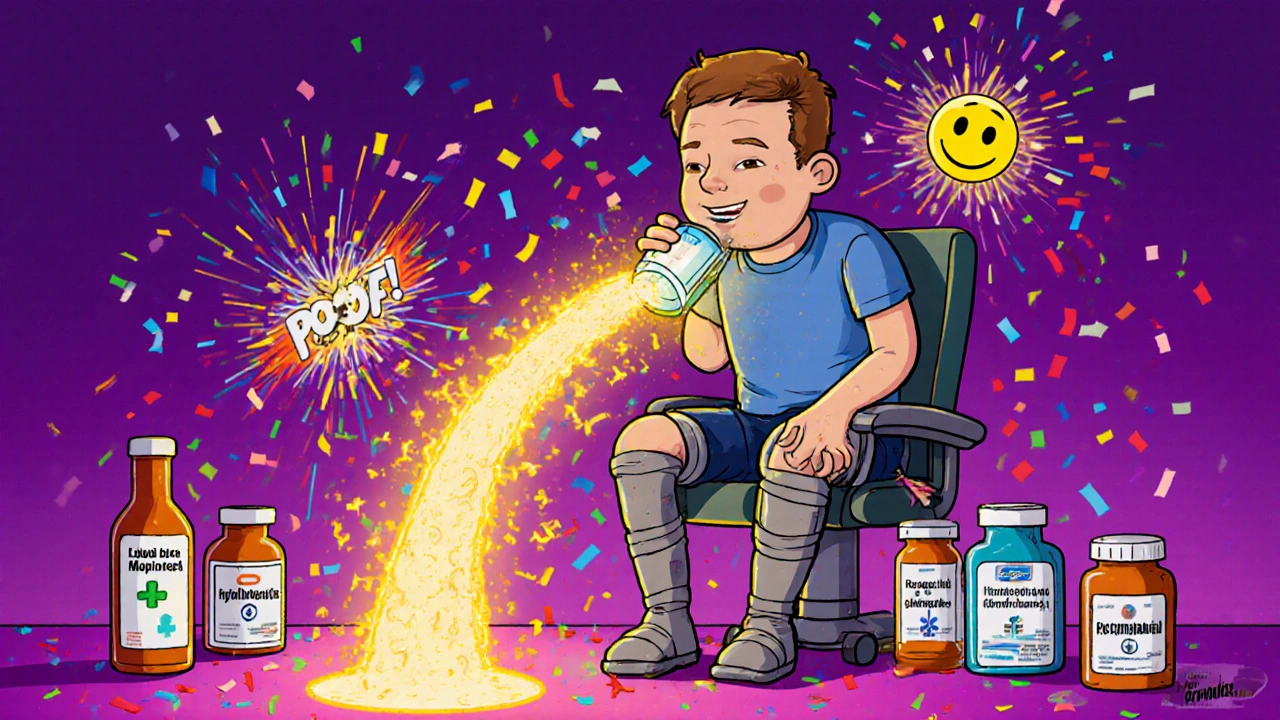
What’s New in Treatment?
The medical community is waking up. In 2022, the American Geriatrics Society updated its Beers Criteria to list 12 high-risk medications for older adults. Since then, 68% of U.S. primary care practices now screen for orthostatic hypotension routinely. New drugs are in development too. Seven pharmaceutical companies are testing alpha-1A selective agonists-medications designed to treat conditions like high blood pressure or prostate issues without triggering dizziness. These could be game-changers. There’s also research into personalized medicine. Phase II trials (NCT04567890) are testing whether genetic markers can predict who’s more likely to develop OH from certain drugs. That could one day mean your doctor picks your meds based on your DNA-not just your diagnosis.When to See a Doctor
Don’t brush off dizziness. Call your doctor if:- You feel lightheaded or faint when standing up, even once.
- You’ve had a fall or near-fall.
- You’re on three or more medications, especially if you’re over 65.
- Your symptoms started after starting or changing a medication.
It’s not normal to feel dizzy. And it’s not something you should live with.
Final Thoughts
Orthostatic hypotension from medications is preventable. It’s not a sign of weakness or aging. It’s a signal-your body telling you something’s off. Too often, doctors and patients ignore it because they assume it’s just part of getting older. But it doesn’t have to be. With the right questions, a careful medication review, and simple lifestyle changes, most people can feel stable again. No fainting. No falls. No fear of standing up.Ask your doctor: “Could my dizziness be from my meds?” That one question might change everything.

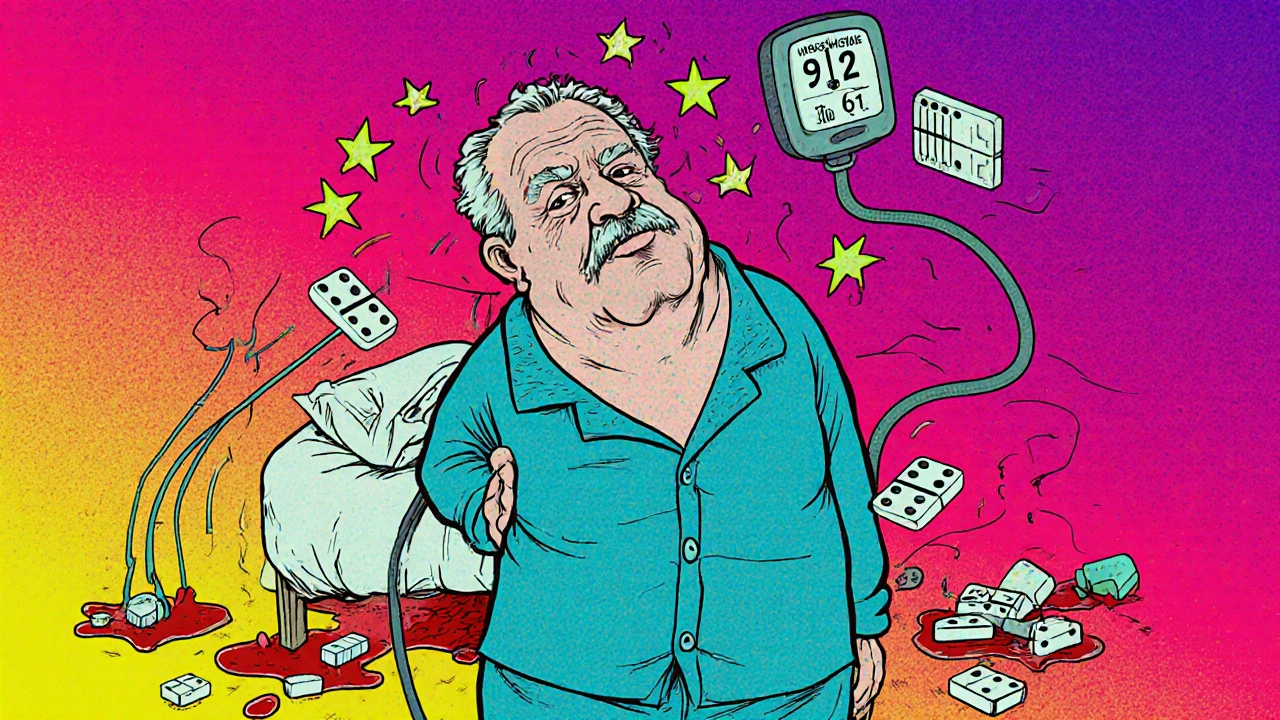
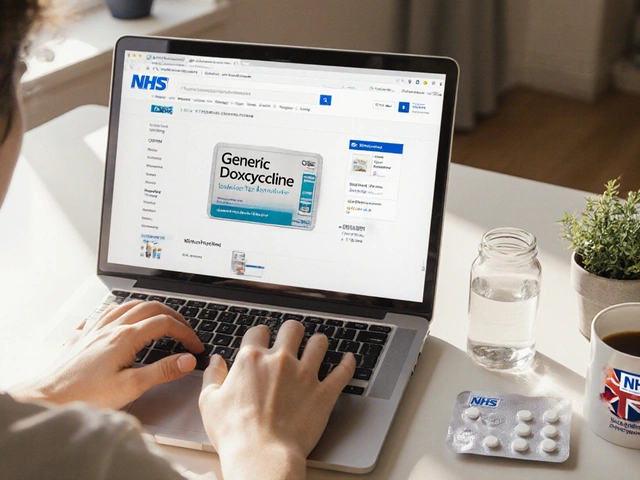
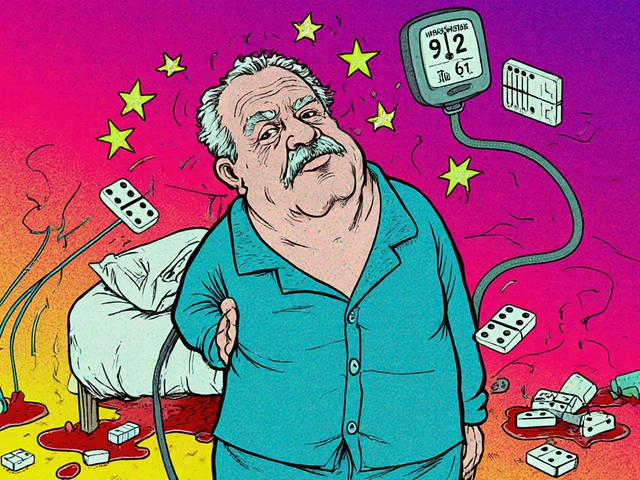
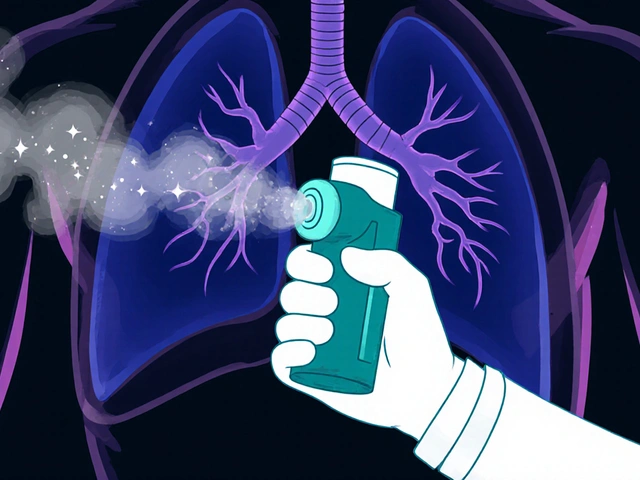
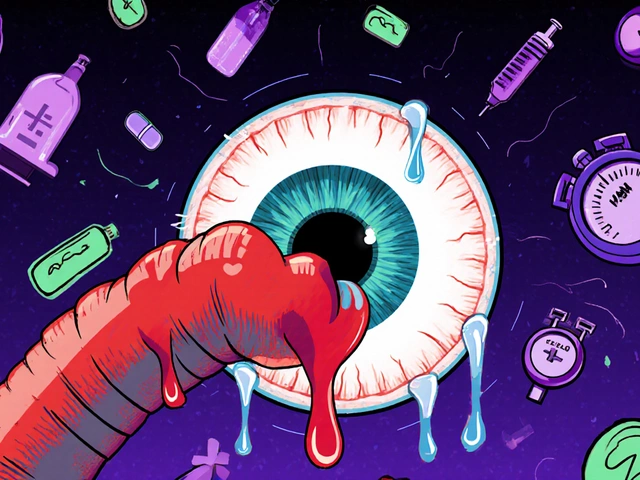

Comments
Sherri Naslund
November 19, 2025 AT 06:39 AMso i was on lisinopril for like 3 years and never felt dizzy until i started drinking matcha every morning. turns out caffeine + blood pressure meds = instant vertigo city. also i stopped taking it cold turkey because my cat sneezed too loud and i thought it was the government broadcasting through my showerhead. now i just stand up real slow and yell at the walls. works better than pharma.
Ashley Miller
November 20, 2025 AT 05:29 AMlol so the pharma companies *want* you to fall? that’s why they don’t put warning labels on the bottles. next they’ll say heart attacks are just ‘bad posture’ and sell you a posture brace for $499. they’re not trying to help you-they’re trying to keep you on the treadmill. ask yourself: who profits when you break your hip? not you.
Martin Rodrigue
November 20, 2025 AT 09:17 AMWhile the clinical presentation of orthostatic hypotension is well-documented in peer-reviewed literature, the assertion that 65–80% of cases are reversible upon medication adjustment lacks sufficient longitudinal data. The 2022 Beers Criteria update does indeed flag polypharmacy risks, but the causal attribution of dizziness to specific agents remains confounded by age-related baroreceptor senescence. A controlled, randomized trial would be necessary to isolate pharmacological contribution from physiological decline.
Tyrone Luton
November 21, 2025 AT 20:04 PMyou think this is about meds? nah. it’s about the collapse of the human nervous system in the age of convenience. we sit all day, then stand up like robots with no muscle memory. our bodies don’t know how to respond anymore. the meds are just the last straw. the real problem? we stopped listening to our bodies because we’re too busy scrolling. you want to fix this? stop taking pills. start walking barefoot. reconnect with the earth. your blood pressure will thank you.
Jeff Moeller
November 23, 2025 AT 18:33 PMstanding up fast is just your body saying hey i’m not a robot stop treating me like one
also why is everyone on 6 meds? i’m 58 and i take one vitamin and a blood pressure pill and i’m fine
maybe we need to stop filling prescriptions like they’re candy
Herbert Scheffknecht
November 24, 2025 AT 11:04 AMwe live in a world where your doctor prescribes you five drugs to fix the side effects of three other drugs. and then you wonder why you’re dizzy when you stand up. it’s not your body failing-it’s the system failing you. the real question isn’t ‘what drug caused this’-it’s ‘why was i ever prescribed all of them in the first place?’
they don’t want you healthy. they want you compliant. and compliant people keep buying pills.
Jessica Engelhardt
November 24, 2025 AT 12:37 PMoh wow so now the government is using blood pressure meds to make old people fall so they can’t protest? that’s why they push diuretics and antipsychotics so hard. you think it’s coincidence? nah. it’s a demographic cleanse. the elderly are expensive. the system wants them out. and dizziness? that’s just the quiet genocide they don’t admit to. check your meds. check your loyalty.
Lauren Hale
November 25, 2025 AT 16:11 PMif you’re on multiple meds and feel dizzy when you stand-don’t panic, but don’t ignore it either. i had a client who thought it was just ‘getting old’ until she fell and broke her wrist. turned out it was hydrochlorothiazide + amitriptyline combo. her doctor switched her to a different BP med and added compression socks. no more dizziness. no more falls. just simple changes. talk to your doctor. ask about alternatives. you deserve to stand up without fear.
Greg Knight
November 26, 2025 AT 07:12 AMyou’re not alone. i’ve seen so many patients come in scared because they think dizziness means they’re ‘falling apart.’ but here’s the truth: your body is just trying to tell you something. it’s not broken-it’s signaling. take it as a gift. a chance to slow down, reassess, and make smarter choices. start with the water. start with the slow stand. start with asking your doctor ‘is this really necessary?’ you’ve got this. small steps, big changes.
rachna jafri
November 28, 2025 AT 02:39 AMin india we don’t have this problem because we don’t take 10 pills a day. we have turmeric, ginger, and our grandmas slapping our legs when we stand too fast. but now? everyone wants to be american and take pills for everything. they sell you a drug for the side effect of the drug they sold you for the problem they invented. this is capitalism disguised as medicine. your blood pressure isn’t broken. your system is.
darnell hunter
November 29, 2025 AT 17:21 PMThe assertion that medication-induced orthostatic hypotension is 'preventable' is statistically overstated. The cited 65–80% reversal rate is derived from non-randomized, retrospective cohort studies with significant selection bias. Moreover, the recommendation to discontinue antihypertensives without titration may induce rebound hypertension, increasing cardiovascular risk. Clinical guidelines do not support abrupt discontinuation. Caution is advised.
Hannah Machiorlete
December 1, 2025 AT 09:55 AMso i was on quetiapine for anxiety and i passed out in the grocery store. no one helped me. just a lady with a cart and a walmart employee who asked if i needed a receipt. my doctor said 'it's common' like that's an excuse. common doesn't mean okay. common means they don't care enough to fix it. now i'm off it and i still feel like a ghost when i stand up. they don't warn you. they just give you the pill and walk away.
Bette Rivas
December 2, 2025 AT 08:34 AMFor patients experiencing orthostatic hypotension, the most effective non-pharmacological interventions are hydration, compression stockings, and slow positional changes. Studies show that drinking 500 mL of water before standing can raise systolic BP by up to 15 mm Hg within 15 minutes due to the water-induced vasoconstrictive response. Compression stockings with 20–30 mm Hg pressure reduce venous pooling in the lower extremities, improving venous return. These are low-risk, high-yield strategies that should be implemented before considering medication changes or adjunctive therapies like midodrine.
prasad gali
December 2, 2025 AT 18:40 PMthe mechanism is clear: alpha-blockers inhibit alpha-1 adrenergic receptors, impairing vasoconstriction during orthostasis. the 2.8x risk increase is statistically significant (p<0.001). however, clinicians often overlook the fact that these drugs are prescribed for benign prostatic hyperplasia in elderly males-where the benefit-risk ratio is frequently misaligned. the real issue? guideline adherence is poor. most primary care docs don't even measure orthostatic vitals. they just write scripts.
Paige Basford
December 3, 2025 AT 11:53 AMi had this issue after my thyroid med was changed. i thought it was stress, but then i started timing my stands-like, sitting for 60 seconds before getting up-and boom, no more lightheadedness. also, i started eating saltier snacks before standing. weird, right? but my doc said it helps. so now i’m the queen of pretzels before coffee. if you’re dizzy, try the slow stand thing. it’s free and doesn’t require a prescription. also, wear socks. cold feet make it worse.